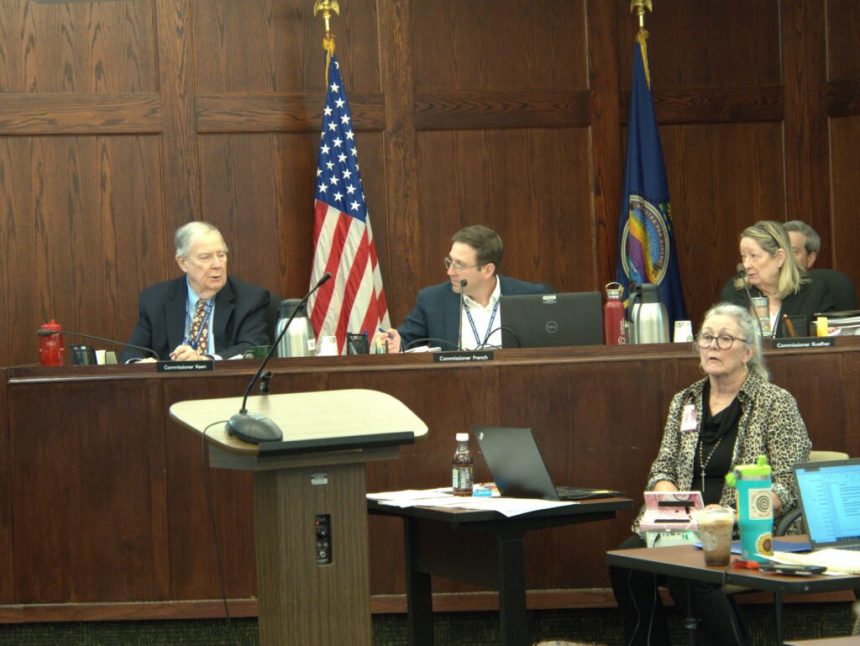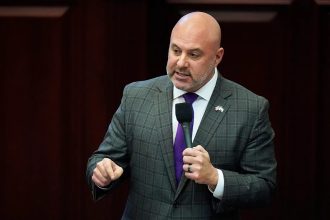The Kansas Corporation Commission, from left, Dwight Keen, Andrew French and Annie Kuether, will make a decision this year on a proposed new utility rate plan and tariff affecting large users such as data centers. (Morgan Chilson/Kansas Reflector)
TOPEKA — Data centers and large manufacturing facilities can pull hundreds of megawatts of electricity from the utility grid. A case in front of Kansas utility regulators has created a new way to ensure costs created by those businesses are fairly distributed among consumers and investors.
On Oct. 8, the Kansas Corporation Commission will consider a unanimous settlement agreement created after multiple consumer, nonprofit and private interest parties worked to reach agreement on a large load service rate plan and utility tariff.
A utility tariff sets up a rate structure and terms and conditions of utility services.
The unanimous agreement designs a rate structure for large-load customers, defined in the agreement as those that reach a peak load of 75 megawatts monthly.
To put that in perspective, Topeka and Lawrence together probably use about 75 megawatts of electricity per month, said Chuck Caisley, Evergy executive vice president of public affairs.
Parties involved in the settlement negotiations included KCC staff, Evergy, the Data Center Coalition, the Citizens’ Utility Ratepayer Board, school districts, Google LLC, the Sierra Club, multiple industrial businesses and the National Resources Defense Council.
“It’s really going to be, I think, a model for the rest of the United States when it’s all said and done,” Caisley said. “It’s unprecedented when you go into a regulatory proceeding like this on such a complicated issue for all the parties to ultimately walk out and say, ‘This would be fair for everybody.’”
Joseph Astrab, consumer counsel at the Citizens’ Utility Ratepayer Board, was part of the negotiations on behalf of small businesses and residential consumers.
“There’s definitely a lot of compromise here,” Astrab said. “This is a unique document. Normally, we file some initial testimony, respond to the application, kind of setting off positions and preferences. But in this docket, we went straight into technical discussions and planning and more of a collaborative approach with utilities, data center customers and other stakeholders in Kansas, to figure out what’s a good tariff.”
Equity between customers
The rise of data centers has pushed forward national policy conversations about large-load users, with the intent often to make sure costs aren’t shifted to other customers or that their significant electricity needs don’t destabilize the grid. The conversations can be at odds with the desire to create a welcoming economic development environment.
The U.S. Department of Energy in January issued a policy statement about mitigation of financial risks should a large user close, leaving an underutilized utility system, and mitigating resource risks if electricity demand would exceed supply, among other issues.
Kansas’ proposed tariff addresses multiple factors, including costs large utility users will bear if they terminate their contract early and other safety nets, Caisley said.
Large-load users will sign a 17-year contract outlining their maximum load projections, he said. Even if the company reduces its electrical demands to 50% or 75% of their projections, the company will be required to pay 80% of that projection, Caisley said.
“There’s no other rate in our system today, not even for giant manufacturers, not for oil refineries, not for the Ford plant, not for the Mars plant – they don’t have a requirement like that,” Caisley said.
A significant amount of collateral is also required to be posted, he said, amounting to two years of minimum bills, which could run to millions of dollars.
Astrab said discussions about rate design captured the “unique notion” that capital investments would not have been made until a later date if a large-load customer hadn’t been coming onto the grid at a specific point.
‘Novel’ element
A third part of the proposed tariff is what Caisley called the “most novel” and an approach that makes the Kansas plan stand out. An interim capacity charge will be in place on top of the regular electrical rate to pay for additional electricity generation that’s required to meet the new demand, he said. It acknowledges that Evergy may need to invest in expansion plans earlier than expected, which comes with a cost.
“As far as I know, that’s one of the first places in the United States that has that, and so these rates will actually be higher than existing industrial consumer rates, but the data centers acknowledge that it’s an issue of equity and fairness,” Caisley said. “From our perspective, if these data centers cause significant rate increases to existing customers, that’s not ultimately good for the state. It’s not ultimately good for economic development.”
Open for business
In strategizing about potential rates, making sure Kansas stayed competitive in drawing companies to locate here was important, Astrab and Caisley said.
“We think that this will protect existing consumers while enabling economic development in Kansas,” Caisley said. “We’ve been calling it the Goldilocks solution. It’s just right.”
Astrab said Kansas policymakers and the governor’s office have made economic development and attracting large business customers a priority.
“With that context in mind, we don’t want to be in the way of developing Kansas’ economies and communities and bringing new businesses to the area,” he said. “We definitely want to make sure that if we do something, it’s not going to be so strict or cost-prohibitive for business that they’ll say, ‘No, we can’t come to Kansas.’”
Caisley said he believes Kansas is leading the way.
“Anytime in today’s society and in the environment that any company or town or regulatory entity operates in today, where you can get everybody with such diverse perspectives and interests around a table and stack hands on something, that means you must have done something right,” he said.
KCC’s three-member commission, which is required to approve the settlement, will hold a one-day hearing about the agreement at 9 a.m. on Oct. 8.









